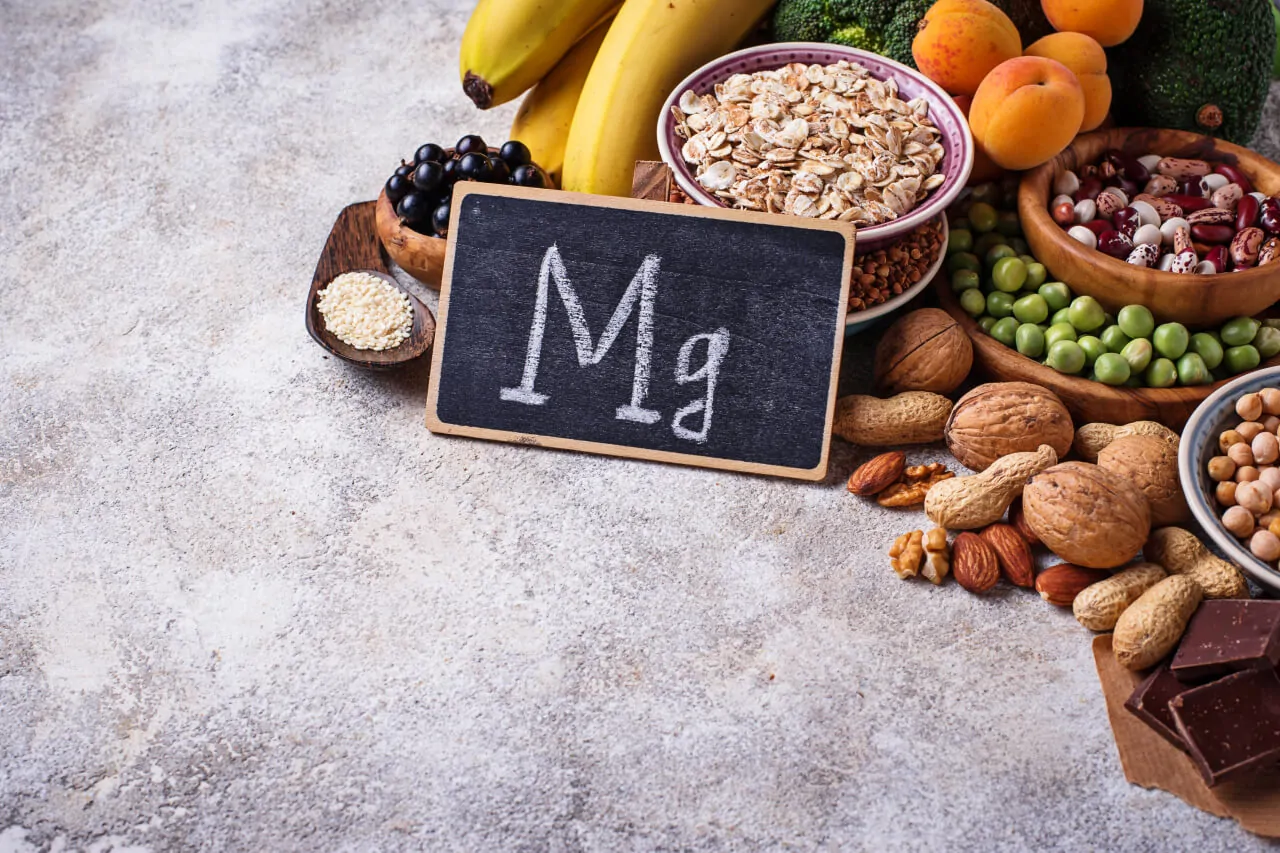In the human body, magnesium is an essential mineral that plays a vital role in many physiological processes.
It plays a role in over 300 biochemical reactions in the human body. It is important for many bodily functions.
It is found in all of the body’s cells, but it is most concentrated in the bones, muscles, and soft tissues.
The adult body contains about 25 grams, with about half of that stored in the bones.
Magnesium role in the human body
This important mineral performs various essential functions within the human body. Here are some key roles:
Enzyme activity
It acts as a cofactor for many enzymes in the body, facilitating their proper function. Enzymes are involved in numerous biochemical reactions that are necessary for the body’s overall functioning.
Energy production
It is a crucial component of ATP, which is the primary energy currency of cells. It is necessary for the production, storage, and utilization of ATP.
Nervous system function
It aids in the transmission of nerve impulses and supports proper nerve function. It contributes to the regulation of neurotransmitters, helping to maintain a healthy nervous system.
Muscle function
It helps in muscle contraction and relaxation. It influences the release of calcium, which is necessary for muscle contractions, and supports the overall coordination of muscular movements.
Bone health
It is involved in bone formation and the metabolism of calcium. It contributes to the development and maintenance of healthy bones and teeth.
Blood pressure regulation
It plays a role in regulating blood pressure by helping to relax and dilate blood vessels. It assists in maintaining healthy blood pressure levels.
Protein synthesis
It is necessary for the synthesis of proteins, which are vital for the growth, repair, and maintenance of cells and tissues in the body.
DNA and RNA synthesis
It is involved in the synthesis and stability of DNA and RNA, which are essential for genetic information storage and transfer.
Immune system support
It supports a healthy immune system, helping to enhance immune responses and defend against infections and diseases.
Magnesium Deficiency
Magnesium deficiency, also known as hypomagnesemia, occurs when there is an inadequate amount in the body.
It can be caused by various factors including insufficient dietary intake, certain medical conditions, or medications that hinder absorption or increase urinary excretion.
Common symptoms of deficiency include muscle twitches, cramps, and spasms, fatigue, weakness, loss of appetite, nausea, vomiting, headaches, and abnormal heart rhythm.
Severe deficiency can lead to conditions such as hypocalcemia (low blood calcium levels) and hypokalemia (low blood potassium levels).
Deficiency may occur in individuals with certain health conditions like gastrointestinal disorders (e.g., Crohn’s disease, celiac disease), kidney disorders, or alcoholism.
Additionally, people who take certain medications like diuretics, proton pump inhibitors may be at an increased risk of deficiency.
It is important to consult a healthcare professional if you suspect any deficiency. They can diagnose your levels through blood tests and recommend dietary changes or supplements to restore levels to normal.
10 Magnesium-Rich Foods
Here are 10 foods that you can include in your diet to boost your health:
Spinach
Spinach is considered to be a good source of magnesium. It is one of the foods commonly recommended for obtaining the mineral in the diet.
A 100-gram serving of raw spinach provides approximately 79 milligrams, which is about 20% of the recommended daily intake for adults.
Including spinach in your meals can be a nutritious way to benefit from its other nutrients, such as vitamins A, C, and K, as well as iron and fiber.
Almonds
Almonds are considered to be a rich source of it.
They are often recommended as a natural and nutritious way to increase your intake.
A 28-gram serving of almonds provides approximately 80 milligrams, which is about 20% of the recommended daily intake for adults.
Almonds also contain other beneficial nutrients like healthy fats, protein, fiber, and vitamin E. They make for a convenient and healthy snack option to boost your levels.
Pumpkin seeds
Pumpkin seeds are often praised for their high magnesium content, making them a great addition to a healthy and rich diet.
A 28-gram serving of pumpkin seeds provides approximately 150 milligrams , which is about 37% of the recommended daily intake for adults.
Pumpkin seeds also offer other nutrients like protein, healthy fats, fiber, zinc, and antioxidants.
They can be enjoyed as a snack, added to salads, or used as a topping for various dishes to increase your intake.
Avocado
Avocado is a nutritious fruit that offers many health benefits, but it is not particularly rich in magnesium compared to other foods. However, it still provides a modest amount.
On average, a medium-sized avocado (around 200 grams) contains about 58 milligrams of magnesium, which accounts for approximately 15% of the recommended daily intake for adults.
Avocados are still a valuable addition to a balanced diet due to their other nutritional qualities.
Avocados are known for their healthy monounsaturated fats, fiber, vitamins (such as vitamin K, vitamin C, and vitamin E), and minerals (like potassium).
Dark chocolate
Cocoa, the main ingredient in dark chocolate, contains a decent amount of magnesium.
The exact amount can vary depending on the specific brand and cocoa content of the dark chocolate, but on average, a 100-gram serving of dark chocolate with a high cocoa content (around 70-85%) can provide around 170-180 milligrams of magnesium.
Dark chocolate also contains antioxidants, fiber, and various nutrients.
However, it is important to note that dark chocolate should be consumed in moderation due to its high calorie and fat content. Choose quality dark chocolate with minimal added sugars and enjoy it as part of a balanced diet.
Quinoa
Quinoa is a gluten-free grain that is packed with various nutrients.
A 185-gram serving of cooked quinoa provides approximately 118 milligrams of magnesium, which accounts for about 30% of the recommended daily intake for adults.
Quinoa is also a great source of protein, fiber, and several other vitamins and minerals.
Incorporating quinoa into your meals can be a nutritious way to increase intake, especially for those following a gluten-free or plant-based diet.
It can be used as a substitute for rice, added to salads, used in soups, or as a base for various dishes.
Black beans
A 100-gram serving of cooked black beans provides approximately 120 milligrams of magnesium, which accounts for around 30% of the recommended daily intake for adults.
Including black beans in your diet can contribute to meeting your needs while also providing other nutrients like protein, fiber, and various vitamins and minerals.
Tofu
Tofu, a popular plant-based protein source made from soybeans, contains a moderate amount of magnesium. The magnesium content in tofu may vary slightly depending on the brand and the type of tofu. On average, a 100-gram serving of firm tofu can provide around 53 milligrams of magnesium, which accounts for approximately 13% of the recommended daily intake for adults.
While tofu may not be the most concentrated source of magnesium, it is still a valuable addition to a balanced diet due to its other nutritional benefits.
Tofu is low in saturated fat and cholesterol-free. It also offers protein, iron, calcium, and other essential nutrients.
Incorporating tofu into meals can contribute to overall magnesium intake, especially for individuals following a plant-based or vegetarian diet.
Tofu is versatile and can be used in various dishes such as stir-fries, curries, salads, or even blended into smoothies.
Fish
Fish can be a good source of magnesium, depending on the type of fish:
- Halibut: Halibut is a type of flatfish that is known for its firm and white flesh. It is not only a good source of magnesium but also provides other nutrients like protein, omega-3 fatty acids, and vitamins B6 and B12.
- Mackerel: Mackerel is a fatty fish that is prized for its rich flavor. Along with being a good source of omega-3 fatty acids, it also contains a decent amount of magnesium.
- Salmon: Salmon is another fatty fish that is known for its abundant omega-3 fatty acids. It is also a good source of magnesium and provides various other nutrients like protein, vitamin D, and vitamin B12.
- Tuna: Tuna is a popular fish that is consumed in many forms, including canned tuna. Fresh tuna is considered to be a better source of this mineral.
It’s important to note that the content can vary depending on factors such as the species, the diet of the fish, and how it is prepared.
Bananas
While they may not have the highest magnesium content compared to some other foods, they do contain a decent amount of this essential mineral.
A medium-sized banana typically provides around 32 milligrams of magnesium, which contributes to the recommended daily intake for adults.
Bananas are also a great source of other important nutrients, such as vitamins C and B6, dietary fiber, and potassium.
Including bananas as part of a balanced diet can help contribute to one’s overall health benefits associated with this versatile and easily available fruit.
Conclusion
Magnesium is an essential mineral that plays a crucial role in numerous processes within the human body.
It is involved in energy production, muscle function, nerve transmission, bone health, blood pressure regulation, and immune support, among other functions.
Incorporating magnesium-rich foods into your diet is a great way to ensure adequate intake.
Spinach, almonds, pumpkin seeds, and dark chocolate are all excellent sources. Including these foods in your meals or as snacks can help boost your magnesium levels and provide additional nutrients.
It’s important to maintain a balanced diet and consult with a healthcare professional if you suspect a deficiency or have specific dietary needs.
By making conscious choices you can support your overall health and well-being.
FAQs
What is magnesium?
Magnesium is a chemical element, symbol Mg, and is vital for many biological processes in humans.
What does magnesium do in the human body?
Magnesium plays a crucial role in maintaining muscle and nerve function, regulating blood pressure, supporting the immune system, and more.
What foods are rich in magnesium?
Spinach, almonds, pumpkin seeds, avocado, dark chocolate, quinoa, black beans, tofu, fish (salmon, mackerel), and yogurt.
What are the symptoms of magnesium deficiency?
Symptoms include muscle twitches, cramps, fatigue, weakness, loss of appetite, nausea, abnormal heart rhythm, and headaches.





